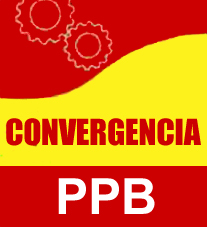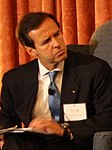
Elections in Bolivia gives information on elections and election results in Bolivia.

The Movement Without Fear is a progressive political party in Bolivia. MSM was founded on March 1, 1999.

The National Unity Front is a political party in Bolivia. It was founded in late 2003 by Samuel Jorge Doria Medina Auza, who had broken with the Revolutionary Left Movement earlier that year. It has thirty six members of the Chamber of Deputies in the Plurinational Legislative Assembly. Despite its substantial share of the urban vote, and sixteen former mayors, it does not control any city halls or governorships. The party is closely identified with Doria Medina's cement company Sociedad Boliviana de Cemento (Soboce).
Adriana Gil is a Bolivian political figure. She has been the party leader of Social Democratic Force (FSD), a movement which bills itself as a left-wing democratic alternative to the President Evo Morales's government.
Samuel Doria Medina Auza is a politician in Bolivia. He is the leader of the National Unity Front and represented the party alongside Carlos Fernando Dabdoub Arrien in the December 2005 Presidential Elections. In that election, Doria Medina finished 3rd with 7.8% of the national vote. He ran again in the 2009 elections and won 5.65% of the vote. Doria Medina ran once again in the 2014 elections; coming out second with 25.1 of the vote.

The 2010 Bolivian regional elections were held on 4 April 2010. Departmental and municipal authorities were elected by an electorate of approximately 5 million people. Among the officials elected are:

Plan Progress for Bolivia – National Convergence was a coalition that was Bolivia's largest national opposition political party following the 2009 general elections. PPB-CN is a Bolivian political alliance of the right-wing formed in advance of the 2009 elections. The alliance was created at a meeting in La Paz's Zona Sur on 4 September 2009 by New Republican Force represented by Manfred Reyes Villa, Plan Progress for Bolivia, represented by José Luis Paredes, the former prefect of La Paz department; Autonomy for Bolivia led by Luis Alberto Serrate Middagh; Peoples Party led by Pablo Nicolás Camacho Bedregal; and the Nationalist Revolutionary Movement, led by Guillermo Bedregal Gutiérrez. However, the alliance did not continue to function in Bolivia's 2014 elections, and several of its elected senators stated in late 2013 that its role is ending.
Popular Consensus was a Bolivian political party founded in 2009. CP founder Óscar Ortiz Antelo was President of the Senate of Bolivia from 2008 to 2010. In the 2009 national election, the party formed an electoral alliance with the National Unity Front, the Consensus Alliance for National Unity, behind the candidacy of Samuel Doria Medina for President. During the 2010 regional election it was involved with the All for Cochabamba and We are all Chuquisaca alliances, and supported the candidacy of Rubén Costas for governor of Santa Cruz. In Pando, the party narrowly lost to the Movement towards Socialism in state elections, and thus formed the principal opposition. CP was replaced by the Social Democrat Movement ("Demócratas") in August 2013.
The first Bolivian judicial election was held on 16 October 2011. The national vote was held to elect magistrates to serve on the Supreme Tribunal of Justice, the Plurinational Constitutional Tribunal, the Agro-environmental Tribunal and members of the Council of the Judiciary. It was originally scheduled to be held on 5 December 2010, but officials of the National Electoral Court and of the MAS majority in the Plurinational Legislative Assembly delayed it. The vote will be the first time that a Latin American country directly elects its highest judicial officials.
The National Council of Ayllus and Markas of Qullasuyu is a confederation of traditional governing bodies of Quechua-, Aymara- and Uru-speaking highland indigenous communities in the departments of La Paz, Oruro, Potosí, Cochabamba, Chuquisaca and Tarija, Bolivia. Specifically, it represents the following 16 suyus: Jacha Carangas, Jatun Quillacas, Asamajaquis, Charcas Qara Qara, Council of Ayllus of Potosí, Qara Qara Suyu, Sora, Kallawaya, Leco, Larecaja, Colla, Chui, Paca Jake, Ayllus of Cochabamba, Kapaj Omasuyus and Yapacaní. CONAMAQ was founded on March 22, 1997, with the purpose of restoring the self-governance of "original nations" including "collective rights to land and natural resources, re-definition of administrative units and self-determination exercised through indigenous autonomies and direct representation in state institutions." CONAMAQ is a member of the National Coordination for Change, and of the Andean Coordination of Indigenous Organizations. It was a member of the Pact of Unity in Bolivia from its founding until December 2011.
The Pact of Unity is an evolving national alliance of Bolivian grassroots organizations in support of indigenous and agrarian rights, land reform, the rewriting of the 1967 constitution through a Constituent Assembly, and a left-indigenous transformation of the Bolivian state. Since 2005, the Pact has been a close ally of Bolivian President Evo Morales, and it forms the nucleus of the National Coordination for Change, a pro-government alliance.
The 2013 Beni special gubernatorial election was held on 20 January 2013. The elections were held to replace the interim governor of Beni Department with an elected executive who will serve until 2015. Numerous observers described the election as an important test of political strength in eastern Bolivia: a MAS victory would signal the retreat of the Media Luna right-wing alliance to Santa Cruz department alone; while a Beni First victory would dash MAS' political ambitions in the department.
René Joaquino Cabrera is a Bolivian politician and the founder the Social Alliance political party. Joaquino was born on February 27, 1966 in the community of Asientos, part of Chicoca Chica ayllu and within the canton of Tomave, Antonio Quijarro Province, Potosí Department. He was twice elected mayor of the city of Potosí, in 2004 and 2010, but was suspended from that office on August 18, 2010. He resumed his duties on February 7, 2013. Joaquino was the city's first indigenous mayor. In the run up to the 2014 national elections, Joaquino reconciled with the Movement Towards Socialism (MAS) party and became their candidate for Potosí's first seat in the Senate of the Plurinational Legislative Assembly. He was elected to that office on October 12, 2014 and will serve as Senator from 2015 to 2020.
The Social Democratic Movement, called Democrats, is a Bolivian political party founded in 2013 by politicians associated with the right-wing of the country's political spectrum and the movement for greater autonomy for the eastern departments of the Media Luna.
The Green Party of Bolivia is a political party in Bolivia, which has a green political orientation. Founded in 2007, it participated in the 2014 general elections, in opposition to the reigning President Evo Morales and the Movement for Socialism. The party is a member of the Global Greens, an international network of green parties, and an observer of the Federation of the Green Parties of the Americas, a regional network of the same.
Damián Condori Herrera is a Bolivian peasant leader and politician who ran unsuccessfully for governor of Chuquisaca Department in 2015. Condori served as executive secretary of the Unified Syndical Confederation of Rural Workers of Bolivia (CSUTCB), Bolivia's largest peasant union. He is the co-founder of We Are All Bolivia, a party founded on April 21, 2016, by dissident former members of the Movement for Socialism–Political Instrument for the Sovereignty of the Peoples (MAS-IPSP). He has been detained since December 2015 as part of the investigation into the Indigenous Fund corruption scandal.
Lilly Gabriela Montaño Viaña is a Bolivian physician, politician, and former senator. She is the elected President of the Plurinational Legislative Assembly, a position she accepted and will hold until 2020 while still the presidential representative of Santa Cruz de la Sierra for the Movement for Socialism (MAS) party. In 2012, Montaño was made the first female interim President of Bolivia since Lidia Gueiler Tejada for a short time. Montaño is a feminist and vocal defender of the rights of the LGBT community. She has been a regular guest and speaker at forums and conferences in different parts of the world. She married Argentine citizen Fabián Restivo, with whom she has had two daughters.

General elections are due to be held in Bolivia in October 2019.














